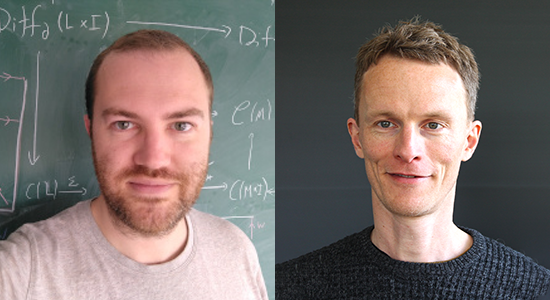The Clay Research Award to Galatius & Randal-Williams
The 2022 Clay Research Award are made to Søren Galatius (University of Copenhagen) and Oscar Randal-Williams (University of Cambridge) for their profound contributions to the understanding of high dimensional manifolds and their diffeomorphism groups.

The two award winners are both parts of the core research team behind Copenhagen Center for Geometry and Topology (GeoTop) at the University of Copenhagen. The Head of Centre, Professor Nathalie Wahl says about their research:
“The most spectacular work that came out of the collaboration between Oscar and Søren is probably the series of papers showing that diffeomorphisms of high dimensional manifolds have the same stability properties as diffeomorphisms of surfaces. Their work was inspired by the computation of the stable homology of diffeomorphisms of surfaces obtained a few years earlier by Ib Madsen and Michael Weiss, but a whole lot of new ideas and tools were needed to approach high dimensional manifolds. Surfaces have quite special properties, and it was surprising to many that high dimensional manifolds should nonetheless behave similarly.
It’s a work that calls for a celebration
“A characteristic of the work of Søren and Oscar is also that they go all the way, giving a complete picture and deducing many explicit computations. This is a complete and very impressive piece of work! It has also been impressive to see the applications this work has led to, most particularly the surprising application, initiated by Kupers, to deducing properties of diffeomorphisms of the disc, a classical question that is suddenly seeing much progress thanks to these results of Oscar and Søren. It’s a work that calls for a celebration, and I was really happy to hear they had received the Clay Research Award for it!” says Nathalie Wahl.
Professor Michael Sørensen, Head of the Department of Mathematical Sciences, says:
“I warmly congratulate Søren on the well-deserved award, which he has received for his groundbreaking research. It is a gratifying recognition of the high academic level of the department that one of our professors and an external member of the GeoTop Centre - and former postdoc here - receive a Clay Research Award”.
See the citation from The Clay Mathematics Institute.
The presentation of the Award to Galatius and Randal-Williams will take place in Oxford in September 2022.
Søren Galatius was born in Randers, Denmark. He earned his Ph.D. from Aarhus University in 2004 under the supervision of Ib Madsen. He then joined the Stanford University faculty, first with a temporary position as a Szegő Assistant Professor and then two years later with a tenure-track position, eventually becoming full professor in 2011. He relocated to the University of Copenhagen in 2016.
Galatius has received several prestigious grants and awards, including a Clay Research Fellowship and a silver medal from the Royal Danish Academy of Sciences and Letters in 2010. In 2017, he won an Elite Research Prize from the Danish Government for his work. He is Vice President for the Danish Committee for Mathematics.
Oscar Randal-Williams is a British mathematician and professor at the University of Cambridge. He studied mathematics at the University of Oxford (MMath 2006, DPhil 2009), where he wrote his doctoral thesis Stable moduli spaces of manifolds under the supervision of Ulrike Tillmann. In 2010 and 2012, he held a postdoctoral position at the University of Copenhagen, member of the Centre for Symmetry and Deformation. Since 2012, he has been at the University of Cambridge, since 2017 as reader and since 2020 as professor.
Randal-Williams received in 2017 Whitehead Prize from the London Mathematical Society and a Philip Leverhulme Prize, in 2018 he was awarded an ERC Starting Grant, and in 2019 the Dannie Heineman Prize of the Göttingen Academy of Sciences and Humanities and the Oberwolfach Prize. He is one of two managing editors of the Proceedings of the LMS, and an editor of the Journal of Topology.
Topics
Related News
Contact
Professor
Søren Galatius
galatius@math.ku.dk
Phone: +4535330581
Head of Centre, Professor
Nathalie Wahl
wahl@math.ku.dk
Phone: +4535321471
Mobile: +4550190135
Head of Department, Professor
Michael Sørensen
michael@math.ku.dk
Phone: +4535330402
Mobile: +4524493455
